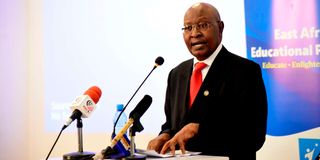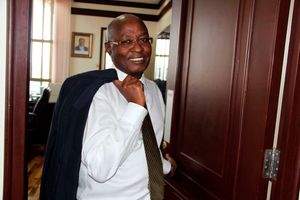
Former Kenya Revenue Authority Commissioner-General Michael Waweru.
If not for anything else, Michael Waweru, who died yesterday, was known for his unyielding commitment to his duties. As a tax collector, he was a man of principles, and carried out his work with a friendliness.
Tax dodgers, who would previously befriend the Kenya Revenue Authority (KRA) Commissioner-General, found a wall that even politicians could not surmount.
“They tried,” Waweru said during the launch of his autobiography.
By the time he died on July 6, 2024, this legacy was intact. He stepped on toes as he collected taxes but built KRA as a friendly outfit with the slogan: Kulipa Ushuru ni Kujitegemea. If anyone dropped the baton later, it was not Waweru’s fault. Tax collection, as he would remark, came with discipline. It was also about integrity of the people who manned the institution.
Shielded by President Mwai Kibaki – who never called to protect tax dodgers – Waweru had found a way to answer back politicians who tested his resolve.
Untaxed goods
As he found out, Eldoret International Airport had become the platform for importers bringing in untaxed goods. He had to close it down, to the chagrin of importers. First, he ordered that all consolidated cargo should bear the names of individual imports, their Personal Identification Number and addresses. But rather than abide by the rules, some of the importers went to see Deputy PM Uhuru Kenyatta, who was also the Minister for Finance. They had hoped he would help them.
As Waweru later recounted in his book, The Tax Czar, “Uhuru called me and said, “Can you come to my office? I want us to sort out this matter about Eldoret Airport.”
But he answered without even thinking: “DPM, I am sorry I will not come.”
Uhuru was taken aback by Waweru’s response. “Why?” he asked.
“Because if I come, from now on all tax matters will be resolved in your office and it is not healthy for you.”
What Waweru did not say was that he wanted to run the show without politicians. The other call came from Eldoret North MP William Ruto, who had met the same traders. Rather than call, Ruto went with them to KRA. When he was told that some of the seized cargo had chemicals for making addictive drugs, “he became restless and looked uncomfortable. He glanced at his watch several times and then abruptly stood up and said: ‘I was going for another meeting. Please proceed without me’.”
Cigarette-making company
Another person who tried to push Waweru was then-Prime Minister Raila Odinga who had asked him to lift an agency notice against a friend running a cigarette-making company.
Waweru told him: “Prime Minister, you don’t have the power to do that.”
And Raila said: “I am the coordinator of government; how come I don’t have the power?”
Waweru’s responded: “Even my minister does not tell me to collect taxes from one person and not another.”
After witnessing President Moi’s struggles with the International Monetary Fund, Waweru’s mission was to protect the ailing Kibaki from similar financial pressures. His close associates, including then Head of Civil Service, Francis Muthaura, protected him by doing the donkey-work and letting integrity drive the individuals. Those who misused that freedom ended up in the murky waters of the AngloLeasing scandal.
Waweru’s commitment bore fruit when David Mwiraria, as Finance Minister, presented a budget devoid of donor dependency – a ground-breaking achievement.
“I felt really nice. We would pick and choose our friends,” he said.
Exceeding revenue targets five times in his nine-year tenure, Waweru helped the Kibaki government achieve fiscal independence.
Waweru was hands-on. Every day at precisely 4pm, he would convene a meeting in the boardroom. This daily revenue update was a ritual.
Sh635 billion
By the time he left, the revenue had soared from Sh180 billion in 2002 to Sh635 billion in 2011, underpinning ambitious national projects.
He had never dreamt of playing such a role as a taxman. When it was thrust to him by President Kibaki, he decided to take the challenge. After 24 years, the Moi regime had run down the economy and tax collection was almost dead. The landscape was fertile with tax dodgers and conmen. KRA was the playground of politicos.
As he took over from John Munge, he was shown a red line to State House. “If that rings,” he was told, “It is from State House!”
But the phone never rang – and he never tried to test it until one day when he told businessman Eddy Njoroge (who had been appointed by Kibaki to revamp KenGen) about the phone.
“Let us see if it works,” Njoroge had jokingly said. To their surprise, it was dead. It meant that Kibaki had no direct line to the taxman.
Waweru had known Kibaki for years. While working with Pannel Bellhouse and Mwangi audit firm, Kibaki was one of his clients between 1982 and 1986. As an accountant, he had known most of the Kibaki men at Muthaiga Golf Club.
Waweru’s journey began in the Rift Valley, where his father worked for colonial settler John Harris. His early years were marked by the chaos of the State of Emergency. Fleeing with his mother, Waweru was left to navigate a disrupted childhood as his father was detained. When his father finally returned in 1956, Waweru did not recognise the “stranger” before him.
Waweru etched his name into history as the inaugural graduate from his Nguka village in Mwea. It is this trajectory of firsts that eventually led to his appointment as the KRA boss.
This role, described by his associates as the true test of his capabilities, was laden with responsibility. Failure would have risked Waweru’s reputation and Kibaki’s legacy.
Formidable company
Initially, Waweru who had left Ernst and Young audit firm had decided to enroll for a Masters degree and later a PhD. That changed when he met Mr Solomon Karanja, who enlisted him in the secretariat of Kibaki campaign. Here, he worked with the likes of Eddy Njoroge, Nat Kangethe, Joe Wanjui and others to craft Kibaki’s manifesto.
After Kibaki’s victory, Waweru thought he was done with his duties. Then the call came and it was Prof Nick Wanjohi on the line. Wanjohi’s query was: “Who do you think is going to deliver on the manifesto you have been working on?” This drew Waweru back into public service.
The rise of TransCentury as a formidable company became the best illustration on building capital. The creation of TransCentury by Kibaki’s allies exemplified the era’s shift towards leveraging positions for entrepreneurial ventures. Just as Heri Limited symbolised Kenyatta-era investments, TransCentury became the nexus for Kibaki’s associates to build a formidable business empire. They bought East African Cables and made billions. They tried their hand at Kenya Railways and burnt their fingers.
Waweru’s personal life mirrored his professional success. Blessed with a supportive wife, Njeri, and three children, he balanced family and a demanding career with grace. His legacy as Kenya’s Tax Czar remains a symbol of dedication and transformation.
[email protected] @johnkamau1

